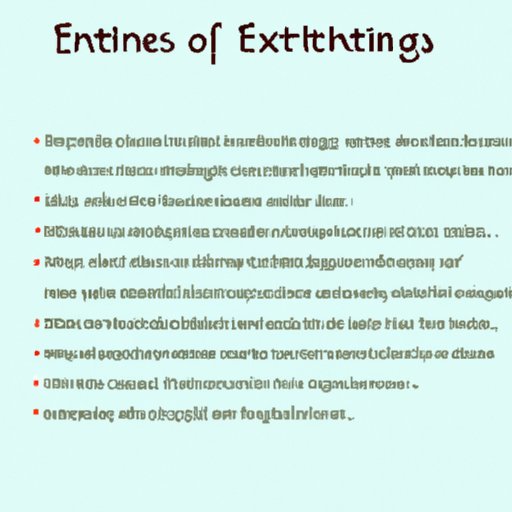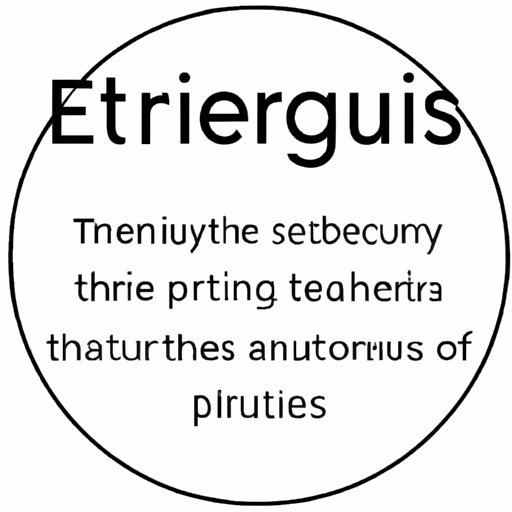Introduction
Ethos is a persuasive technique used to convince an audience by appealing to its ethics or morality. It is one of the three main persuasive techniques, alongside pathos (appealing to emotion) and logos (appealing to logic). This article will explore the definition and examples of ethos in writing, its importance in creating credibility, how to use it to build trust with your audience, and how to craft a strong ethos through storytelling.
Exploring the Definition and Examples of Ethos in Writing
So, what is ethos? Ethos is a Greek term meaning “character” or “ethics.” In rhetoric, ethos is used to refer to the writer’s or speaker’s credibility—their authority and trustworthiness—in the eyes of their audience. By appealing to the ethics, morality, or character of their audience, a writer or speaker can persuade their audience to accept their argument.
How does ethos differ from other persuasive techniques? Unlike pathos and logos, which focus on the content of the argument, ethos focuses on the credibility of the author or speaker. The goal of ethos is to demonstrate why the audience should believe the writer or speaker by establishing their credibility and trustworthiness.
Examples of how authors use ethos include: citing reliable sources to back up their claims, providing evidence to support their argument, and using personal experiences to illustrate their point. Additionally, authors may use language that conveys their knowledge and expertise on the subject.
How Ethos Enhances Writing to Create Credibility
Why is credibility important? Establishing credibility with readers is essential for persuading them to accept your argument. If readers do not trust or believe the author, they are less likely to be swayed by the argument. Therefore, it is important for writers to establish their credibility and trustworthiness with their audience.
Strategies for creating credibility with readers include: using accurate and reliable sources, avoiding biased language, presenting both sides of an argument, and being transparent about any potential conflicts of interest. Additionally, writers can show their knowledge and expertise on the topic by using relevant facts and evidence to support their argument.

Using Ethos to Build Trust with Your Audience
The importance of trust cannot be overstated. When readers trust the author, they are more likely to accept the argument. To establish trust with readers, authors must demonstrate their honesty and integrity. This can be done by avoiding biased language, being transparent about any potential conflicts of interest, and providing accurate and reliable sources. Additionally, authors should strive to be consistent in their message and avoid making exaggerated or false claims.
The Power of Ethos to Convince an Audience
The importance of making a compelling argument cannot be overstated. By appealing to the ethics and morality of an audience, writers can create an emotional connection with readers and convince them to accept their argument.
Tips for using ethos effectively include: using accurate and reliable sources, avoiding biased language, presenting both sides of an argument, and being transparent about any potential conflicts of interest. Additionally, writers should strive to be consistent in their message and avoid making exaggerated or false claims.

Crafting a Strong Ethos Through Storytelling
What makes a story compelling? Stories have the power to evoke strong emotions in readers and connect with them on a deeper level. Stories can also help to create credibility and trust between the author and reader.
The role of stories in creating credibility is twofold. First, stories can provide an example of how the author’s argument applies to real life situations. Second, stories can make complex concepts easier to understand and relate to. By crafting stories that illustrate the author’s point, writers can create a powerful ethos and convince their audience to accept their argument.

Understanding Ethos as an Essential Component of Effective Writing
The importance of ethos in effective writing cannot be overstated. Ethos is a powerful tool for convincing an audience to accept an argument. Writers must strive to establish their credibility and trustworthiness with readers in order to persuade them to accept their argument.
How to use ethos to craft more effective writing? Writers can create credibility and trust with their audience by using accurate and reliable sources, avoiding biased language, presenting both sides of an argument, and being transparent about any potential conflicts of interest. Additionally, writers should strive to be consistent in their message and use storytelling to illustrate their point.
Conclusion
In conclusion, ethos is a persuasive technique used to convince an audience by appealing to its ethics or morality. It is important for writers to establish their credibility and trustworthiness with their audience in order to persuade them to accept their argument. Strategies for creating credibility include: using accurate and reliable sources, avoiding biased language, presenting both sides of an argument, and being transparent about any potential conflicts of interest. Additionally, writers can use storytelling to illustrate their point and evoke strong emotions in readers. Understanding and utilizing ethos is an essential component of effective writing.
(Note: Is this article not meeting your expectations? Do you have knowledge or insights to share? Unlock new opportunities and expand your reach by joining our authors team. Click Registration to join us and share your expertise with our readers.)
